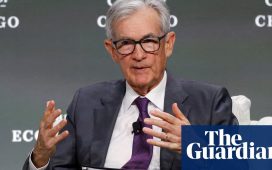London’s blue-chip share index, the FTSE 100, hit a new all-time high at over 8,000 points on Thursday.
But why is the FTSE 100 so strong, when the UK economy is expected to fall into recession this year and so many businesses and households are struggling? Five factors have helped the share index outperform other global markets since the start of last year.
The energy boom
The jump in oil and gas prices after Putin’s invasion of Ukraine a year ago has buoyed the profits and share prices of the FTSE 100’s two oil giants.
Shares in Shell have gained almost 60% since the start of last year, from £16.22 in January 2022 to more than £25 today, making Shell the most valuable member of the index, at £179bn, matching AstraZeneca.
Shares in BP have climbed by almost two-thirds since the start of 2022, from 330p to 555p today.
Both companies have reported record profits for last year, with BP more than doubling its earnings to $28bn (£23bn), and Shell making annual profits of $40bn in 2022, up from the $19bn in 2021.
The biggest FTSE riser on Thursday was British Gas owner Centrica, after it reported a tripling of annual profits to a record £3.3bn for 2022.
Bumper profits at energy companies have angered campaigners who are calling for tougher windfall taxes.
It’s the global economy
The FTSE 100 tracks the 100 largest companies listed in London, and its largest members are multinationals whose sales and profits come from around the world.
Companies in the FTSE 100 derive approximately 75% of their revenues from overseas. The fortunes of banking giant HSBC (the third most valuable company on the index, worth £122bn) or Unilever (number four, at £107bn) depend on the global economy, rather than just the UK.
Hopes for the global recovery have risen this year, as wholesale energy prices have fallen back. Inflation in major economies including the US may have peaked, suggesting central banks might begin to ease the pace of rapid rate hikes. The IMF lifted its growth forecasts for this year at the end of January, predicting the UK would be the only advanced economy to shrink in 2023. While UK GDP could shrink by 0.6%, global growth is forecast by the IMF to be 2.9% this year.
FTSE earnings are influenced by changes in the foreign exchange market, where the pound has depreciated against the euro and US dollar over the last year.
UK might do better than thought
Hopes that UK recession will be less severe than previously feared have also lifted stocks in London this year. The Bank of England now expects a less severe downturn this year, with inflation expected to fall sharply in 2023.
The Bank is now forecast to stop its cycle of raising interest rates this summer, with the City now anticipating Bank rate could peak below 4.5% in August. After the turmoil of last autumn’s mini-budget, rates were expected to hit 6%.
A shallower recession would support consumer spending. UK retailer JD Sports has been the top riser so far this year, up a sparkling 46% since the beginning of January, with British Airways parent company IAG having gained 35%.
after newsletter promotion
Shareholder payouts
The FTSE 100 contains a lot of companies that pay decent dividends, so is attractive to investors seeking to generate income.
FTSE 100 dividends are forecast to hit a record high this year, with shareholders expected to receive £85.8bn, up from £79.1bn in 2022.

Share buybacks, where companies use spare cash to acquire and cancel their own share, have also boosted the FTSE 100. Both BP and Shell have announced billions of pounds of share buybacks – a way of returning cash to investors – during 2022. Some of the big shareholder handouts have come in for criticism, with the argument being that the cash could instead be used to increase investment in renewables and reduce prices.
The FTSE lacks tech stocks
The FTSE 100 has a decidedly old-economy feel to it. Banks, oil companies, and tobacco firms reek of the 20th century, while the index lacks the major technology companies which boomed in the pandemic.
But London’s largest companies look more attractive in the current environment, where investors are favouring defensive stocks, and those which benefit from higher commodity prices and interest rates.
Tech stocks on the other hand have fallen out of favour in recent months, with Amazon, Alphabet, Apple, Meta and Tesla all down compared with six months ago.
“During the Covid-19 pandemic, tech companies and growth stocks were massively in fashion – precious few of which are included on London’s main index,” says John Moore, senior investment manager at RBC Brewin Dolphin.
“Now, with inflation persistently high, elevated oil prices, and interest rates rising the consumer staples giants, oil and gas explorers, mining groups, and financials that make up the FTSE 100 are looking at a much more supportive near-term environment,” Moore explained.








